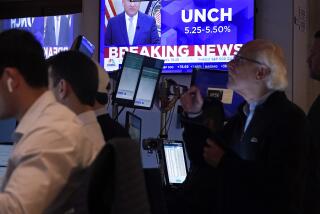TOP STORIES--MARCH 31-APRIL 5
- Share via
Andersen Sells Off Pieces of U.S. Business
Accounting firm Andersen continued its slow disintegration, reaching tentative agreements to sell pieces of its U.S. business to rivals Deloitte & Touche and KPMG.
The firm also conceded defeat in its effort to transfer its overseas operations to KPMG in a single deal after the Andersen partnership in Spain decided to merge with the Deloitte office there. The 83 individual partnerships that make up the overseas portion of Andersen are working to cut their own deals with rival firms.
Meanwhile, Andersen is braced to lay off up to 7,000, or 25% of its U.S. staff, this week, possibly as early as Monday.
And representatives of the firm met with Justice Department officials to see whether the two sides could work out a settlement in the criminal indictment of the firm for destroying documents sought in the federal probe of its work for energy trader Enron Corp.
March Job Creation Surpasses Cutbacks
For the first time in nearly a year, U.S. employers last month created more jobs than they cut, but it was not enough to keep the unemployment rate from rising slightly.
The latest government employment figures showed that the number of payroll jobs increased 58,000 in March, the first net gain since July 2001, and another sign that the economy is rebounding from last year’s downturn.
The jobless rate edged up to 5.7% in March from 5.5% in February, but remained below the 5.8% level recorded last year.
Analysts attributed the divergent readings to different survey methodologies and other statistical quirks.
Oil Prices Rise on Middle East Fears
Prices of oil futures hit a six-month high last week and retail gasoline prices continued to rise, amid fears that escalating violence in the Middle East would squelch petroleum supplies.
Rising oil prices threaten the fledgling economic recovery by adding unexpected costs to consumers as well as to manufacturing, transportation and other business sectors, analysts said.
The May contract for West Texas intermediate crude, the U.S. benchmark, bumped briefly above $27 before ending the week at $26.21 a barrel on the New York Mercantile Exchange.
The last time oil was this expensive was the week after the Sept. 11 terrorist attacks.
Oil prices have jumped nearly 8% in the last week as a series of suicide bombings brought the biggest military response by Israel in decades.
FCC Told to Review TV Ownership Limit
A U.S. appeals court ordered federal regulators to justify a long-standing rule barring media companies from owning more than one TV station in about half of the nation’s television markets.
The court ordered the agency to review its duopoly rule, which allows a company to own two stations in a small or mid-size market. The rule was adopted in 1964 when there were only 649 television stations in the U.S., compared with nearly 1,700 outlets today in 283 television markets.
The ruling marked the fourth time in 18 months that federal judges have overturned or set aside FCC regulations limiting media ownership.
Acquisition-minded media giants such as News Corp. and Viacom Corp. have been pushing Washington to change ownership rules so they can expand their empires.
Consumer groups and some lawmakers, however, oppose the prospect of further media consolidation, arguing that this will put greater control over news, information and entertainment into the hands of just a few giants.
Adelphia to Sell Some Cable Systems
Adelphia Communications Corp. has agreed to sell up to half of its cable systems, worth as much as $8 billion, to pay off some of its debt.
John Rigas, the 77-year-old founder of Adelphia, has agreed to put up for sale operations that include his prized Los Angeles systems, which he acquired only two years ago, sources close to the company said.
Shares have fallen about 50% since the company disclosed that it had guaranteed $2.3 billion in loans to off-balance-sheet partnerships.
The Securities and Exchange Commission is conducting an informal investigation.
Microsoft President Out in Reorganization
Microsoft Corp. announced a shake-up in its management structure that includes the resignation of President and Chief Operating Officer Rick Belluzzo just 14 months after he assumed the posts.
The reorganization ends an awkward relationship between the software behemoth and Belluzzo, a veteran of Silicon Valley hardware stalwarts Hewlett-Packard Co. and Silicon Graphics Inc.
Since joining Microsoft in September 1999, insiders say, he has failed to embrace the company’s distinctive corporate culture--a shortcoming that led to his ouster.
Microsoft said the reorganization will give more autonomy to the leaders of the company’s core business units. Belluzzo, 48, said the change will give him the opportunity to return to a role as CEO, a position he held for less than two years at Silicon Graphics Inc.
Domestic Auto Sales Continue to Hold Up
The auto industry reported strong sales for March and the first quarter of 2002--slightly below last year’s pace but still in near-record territory.
Ford Motor Co., however, reported an 11.7% drop in March sales compared with the year before, and the industry overall was down 1.6% for the month.
A cutthroat discounting war led by General Motors Corp. has helped prop up the domestic car makers’ sales. But few importers are following, and their strong sales are further evidence of an economic recovery, analysts say.
Industry analysts also point to rising U.S. employment, consumer spending and consumer confidence levels as signs that a broad-based economic rebound is underway.
Most are expecting that to translate into new-car and light-truck sales for the year in the range of 16.3 million to 16.7 million units.
HP Won’t Reappoint Hewlett to Its Board
Hewlett-Packard Co. withdrew its nomination of Walter Hewlett from its slate of directors.
The decision effectively ousts the dissident board member who crusaded against the company’s pending $19-billion merger with Compaq Computer Corp.
It’s the latest volley in an extraordinary battle between HP and the son of co-founder William Hewlett.
Walter Hewlett, 57, amassed broad support among shareholders in opposing the merger.
Although an official tally of the March 19 shareholder vote will not be available for several weeks, HP Chief Executive Carly Fiorina has declared a “slim but sufficient” margin in favor of the merger.
Hewlett filed a lawsuit March 29 alleging that company executives coerced a large shareholder to endorse the merger and understated the difficulties in creating what would be the largest computer company in the world.
Hewlett has argued that HP’s profitable printer business would be diluted by Compaq’s commitment to the struggling PC market.
Golf Properties Firms Closer to Merger
The board of National Golf Properties Inc. announced its approval of a definitive merger agreement with ailing sister company American Golf Corp. despite the objections of a major National Golf stockholder and concern among Wall Street analysts.
Combining the two Santa Monica-based companies, which are controlled by Los Angeles businessman David G. Price, would create the country’s largest owner and operator of golf courses and help the companies overcome immediate financial troubles and long-term competitive pressures, supporters of the combination said.
American Golf is a privately owned company that leases and operates most of the courses owned by National Golf, a publicly traded real estate investment trust.
But the companies’ independent auditor raised doubts about the viability of both firms in light of financial problems and a barrage of lawsuits, according to filings with federal regulators.
Xerox Agrees to Pay Record SEC Fine
Xerox Corp. agreed to pay a record $10-million fine and to restate five years of financial results.
The agreement in principle, subject to final approval by the Securities and Exchange Commission, would settle an investigation launched in 2000 of Xerox’s alleged premature booking of more than $2 billion in revenue from equipment leases from 1997 through 2001.
Under the agreement, the Stamford, Conn.-based copier giant would neither admit nor deny wrongdoing, the company said.
But the fine would be the highest ever for a financial reporting violation by a public company, eclipsing the $3.5-million penalty levied against America Online Inc. in May 2000 for allegedly improperly inflating earnings, SEC spokesman John Nester said.
*
For a preview of this week’s business and economic news, please see Monday’s Business section.
More to Read
Inside the business of entertainment
The Wide Shot brings you news, analysis and insights on everything from streaming wars to production — and what it all means for the future.
You may occasionally receive promotional content from the Los Angeles Times.










